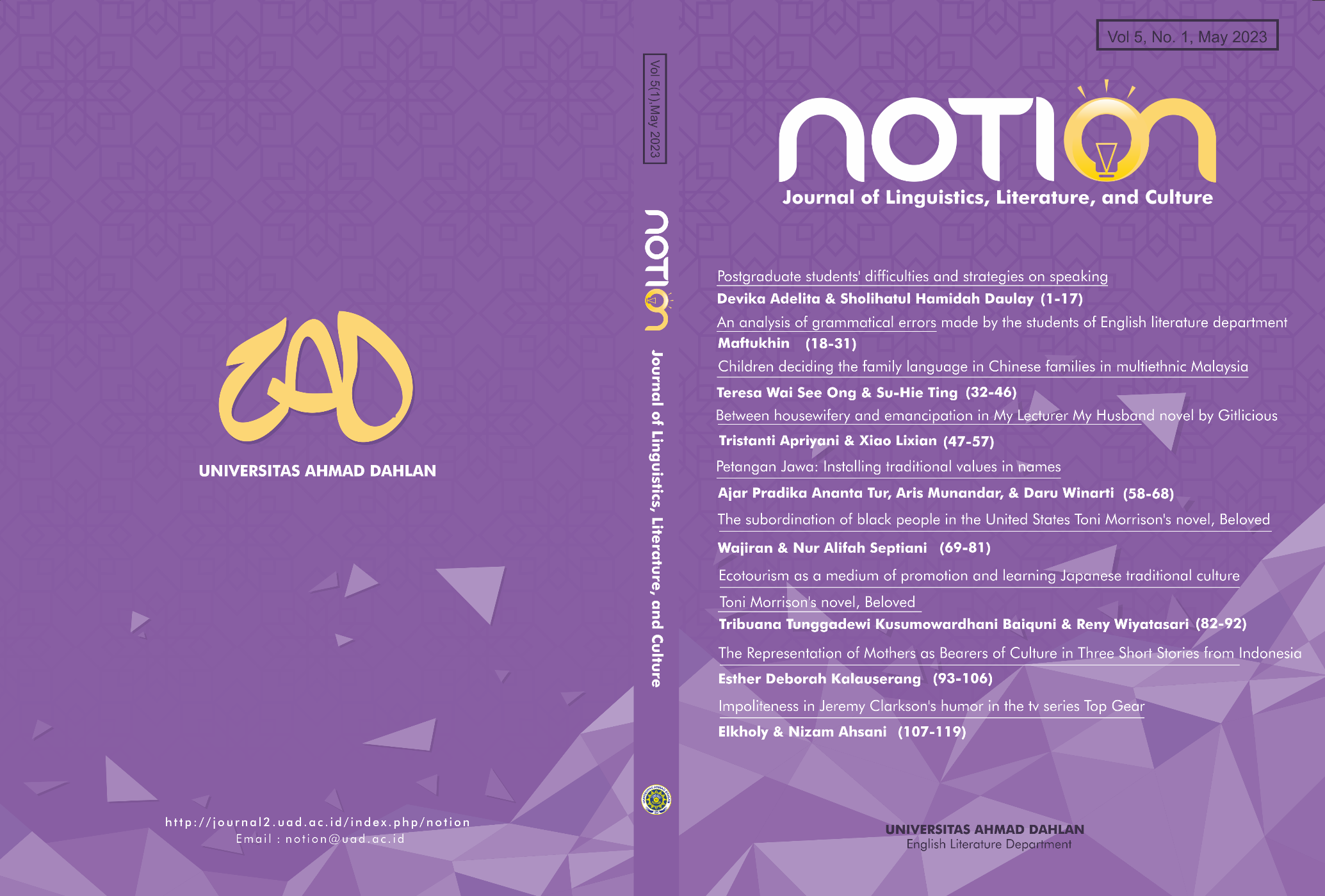Impoliteness in Jeremy Clarkson’s humor in the tv series Top Gear
DOI:
https://doi.org/10.12928/notion.v5i1.7637Keywords:
pragmatics, impoliteness, jeremy clarkson, humor, top gearAbstract
This research was conducted to observe impoliteness strategies employed by Jeremy Clarkson in his humor in the TV Series Top Gear with the intention to unveil which strategy he utilized most and elucidate the reason upon the most and least occurring impoliteness strategies. The present research utilizes Culpeper’s (1996) model of impoliteness super strategies as the main framework to identify, analyze, and elaborate the research data. Other theories related to impoliteness such as face-threatening act and politeness was also utilized to assist the analysis process. The result of the research revealed that negative impoliteness strategy was the most commonly used strategy through which Jeremy Clarkson delivers his humor. Contrary to the withhold politeness strategy which accounted for the least occurring strategy. The explanation upon the result to be the way they are could be referred back to Jeremy Clarkson’s main intentions of uttering impolite remarks—in an effort to amuse the audience and keep the show entertaining.
References
Al-Majdawi, A. M. and Abbas, A. N. (2018). A pragmatic analysis of impoliteness in selected British social interviews. International Journal of Science and Research, Vol. 7(9), p. 536–42. https://doi.org/10.21275/ART20191088
Baker, P. and Ellece, S. (2011). Key terms in discourse analysis. London: Continuum.
Bousfield, D. (2008). Impoliteness in Interaction. Amsterdam: John Benjamins Publishing Company.
Brown, P. and Levinson, S. C. (1987). Politeness: Some universals in language usage. New York: Cambridge University Press.
Culpeper, J. (1996). Towards an anatomy of impoliteness. Journal of Pragmatics, Vol. 25 (3), p. 349–67. https://doi.org/10.1016/0378-2166(95)00014-3
Culpeper, J. (2011). Impoliteness: Using language to cause offence. New York: Cambridge University Press.
Cutting, J. (2002). Pragmatics and discourse. A Resource Book for Students. London: Routledge.
Fitria & Tur, A.P.A. (2019). From Abstract to Concrete: Associating the Users’ Tweets on “Success”. Indonesian Journal of EFL and Linguistics, Vol. 4(2), p. 121-134. https://pdfs.semanticscholar.org/3af5/b3f2fe46421b4da5819ccb6c799aa9d9f6fa.pdf
Hafisa, A. and Hanidar, S. (2020). Impoliteness strategies in Trevor Noah’s afraid of the dark stand-up comedy show. Lexicon, Vol. 7 (2), p. 215–23. https://doi.org/10.22146/lexicon.v7i2.66571
Leech, G. N. (1983). Principles of pragmatics. New York: Longman.
Sari, F.A. and Tur, A.P.A. (2019). Reshaping the society face through the culture of horror told in Shirley Jackson’s the lottery. Notion: Journal of Linguistics, Literature, and Culture, Vol. 1 (1), p. 1-7. https://doi.org/10.12928/notion.v1i1.709
Tur, A.P.A. (2019). Patterns of linguistics features in private chat of social media account leading a person to be a victim of a cybercrime. LEKSIKA, Vol. 13(1), p. 29-38. https://jurnalnasional.ump.ac.id/index.php/LEKSIKA/article/view/3858/2423
Tur, A.P.A. (2022). Trend of having more name parts in homogenous community. BAHASTRA, Vol. 42(1), p. 17-25. http://journal1.uad.ac.id/index.php/BAHASTRA/article/view/66/18
Yule, G. (1996). Pragmatics. New York: Oxford University Press.
Downloads
Published
Issue
Section
License
Copyright (c) 2023 Elkholy, Nizam Ahsani

This work is licensed under a Creative Commons Attribution 4.0 International License.
Authors who publish their articles in NOTION: journal of Linguistics, Literature, and Culture agree to the following terms:
- Authors retain the copyright and grant the journal right of first publication with the work simultaneously licensed under a Creative Commons Attribution 4.0 International License that allows others to share the work with an acknowledgement of the work's authorship and initial publication in this journal.
- Authors are able to enter into separate, additional contractual arrangements for the non-exclusive distribution of the journal's published version of the work (e.g., post it to an institutional repository or publish it in a book), with an acknowledgement of its initial publication in this journal.
- Authors are permitted and encouraged to post their work online (e.g., in institutional repositories or on their website) prior to and during the submission process, as it can lead to productive exchanges, as well as earlier and greater citation of published work.





